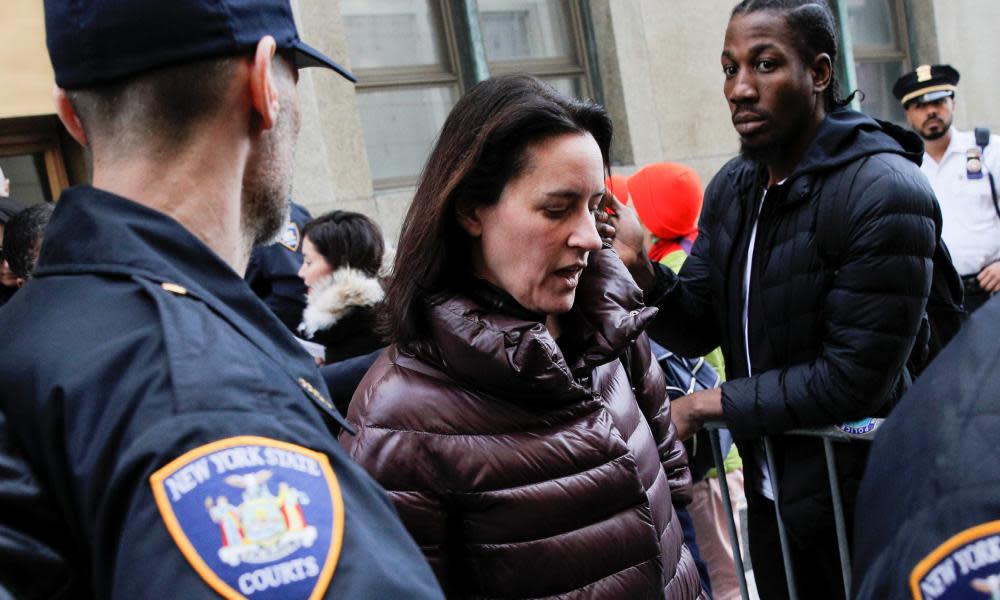Weinstein jurors face next challenge: media pressure to tell their stories

“The whole thing, it was long – looooong,” was how the jury foreman Bernard Cody put it to the New York Daily News. “It was stressful.”
Related: Rose McGowan: Weinstein 'could be one of the biggest serial rapists in history'
As understatements go, that was a good one. Seven weeks of high-wire courtroom drama; six hours a day of intense testimony from a succession of women crying on the witness stand as they described being sexually attacked by Harvey Weinstein; five days of nerve-shattering deliberations before the jury found the fallen movie mogul guilty of rape and a criminal sex act.
So yes, it was long and it was stressful.
Now the Weinstein jury of seven men and five women, who collectively dispatched the once-powerful Hollywood titan to a prison cell, are facing a fresh challenge. The pressure of the trial at the New York supreme court is over, but the scramble has only just begun by TV and cable networks to secure their exclusive stories about how they reached their verdict.
Unlike other jurisdictions such as the UK, where the media is strictly forbidden from eliciting jurors’ accounts of criminal trials, in the US the first amendment right to free speech ensures that it is open season from the moment the 12 women and men are discharged from their duties.
In high-profile cases such as the Weinstein trial, which was seen as the first big test in a court setting of the #MeToo movement, an entire media industry has developed around gaining exclusive access to key jurors.
TV channels employ researchers to sit in court for the duration of the trial specifically to identify the jurors and approach them the instant the verdict is handed down.
A day after the trial ended Inside Edition was the first out of the gate with an on-camera of a woman identified only as juror N0 2 . “Tensions were very high, everyone was very nervous,” the juror said about the deliberations.
The moment when the jurors found themselves in unanimous agreement – they had their verdict and Weinstein was about to become a convicted criminal – was tough. “My hands were sweating. I felt like my heart was gonna pop out of my chest.”
Juror No 2 said she didn’t even know who Weinstein was when she was called in for jury selection. “I’m sorry, I didn’t know who he was until someone broke it down for me and I was ‘Oh, that’s him’,” she told Inside Edition.
The juror’s most interesting insight was that behind the closed door of the jury room, one of the 12 became dominant in deliberations. “We had one person take control, he was the person that put everyone on the right path.”
Which one of the seven men fits that description will probably never be known. Before they were allowed to go their separate ways, the judge in the case, James Burke, gave the jurors firm instructions.
You can freely talk to the media if you like, Burke told them, but you would be wise to stick only to your own experiences of the trial. Try not to disclose the views expressed by other members of the jury as that would be to betray the trust that your peers placed in you.
TV bookers will be desperately trying to single out that assertive male juror who swung the discussion towards its conclusion, sending Weinstein to the prison ward of Manhattan’s Bellevue hospital where he is now being held after complaining of chest pains on his way to the notorious lock-up on Rikers Island. He will be brought back to court on 11 March for sentencing.
One other juror will be the subject of fierce competition among the networks to get her onto camera – juror No 11. A real estate broker in New York, she became the subject of heated legal argument in court when Weinstein’s defense team objected to her being part of the jury on grounds that she had written a soon-to-be-published novel about a predatory older man taking advantage of younger women.
Once the trial was underway, defense lawyers made a second attempt to have her booted off the jury, forcing the woman to be hauled in front of Burke. Investigators employed by Weinstein to surveil the internet activities of all the jurors discovered that juror No 11 had reviewed a novel called My Dark Vanessa, referring to the isolation of the title character and the “repulsiveness of her predator”.
Burke listened to the defense argument, then ruled that the juror had done nothing wrong. Juror 11 was sent back to complete her jury service, looking mighty displeased.
She has indicated to the Guardian that she has no plans to talk to the press at present. But that doesn’t make her immune from the advances of television, and with her debut novel scheduled to be released in the summer she may find the publicity irresistible.


